An efficient water filter is necessary to ensure that the water you use in your home is safety to use. Here are some qualities that the best whole house water filter should have.
The filter system should have large filter housings that can stand strong pressures from water valves. A multi-gradient density filter offers assurance that most dirt particles are filtered out, and that water flowing into the house is safe for use.
- Abundant Flow Water AI25 2510SXT Whole House Water Filter
- Home Master HMF3SDGFEC Whole House Water Filter
- iSpring WGB32B Whole House Water Filter
- Reverse Osmosis Revolution WHF-34V2
- CRYSTAL QUEST® Whole House Water Filter
- 3M Aqua-Pure AP902 Whole House Water Filter
- Aquasana EQ-1000-AMZN Whole House Water Filter
- GE GXWH20S Whole House Water Filter
- Express Water WH300SCGS Whole House Water Filter
- APEC Water Systems CB1-CAB20-BB Whole House Water Filter
Whole House Water Filter Reviews
Abundant Flow Water AI25 2510SXT Whole House Water Filter
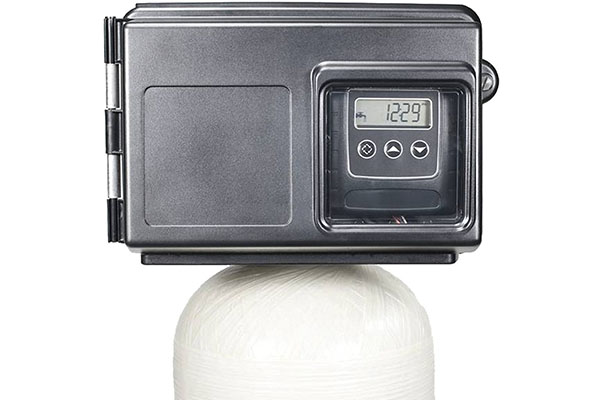
AI25 2510SXT Whole House Water Filter uses its built-in air injection system to perform its intended function efficiently, including the removal of sulfur and iron. It features a patented piston design, supporting the air injection process in just one tank.
>>>> Click Here To See Customer Reviews & Current Price <<<<
Home Master HMF3SDGFEC Whole House Water Filter
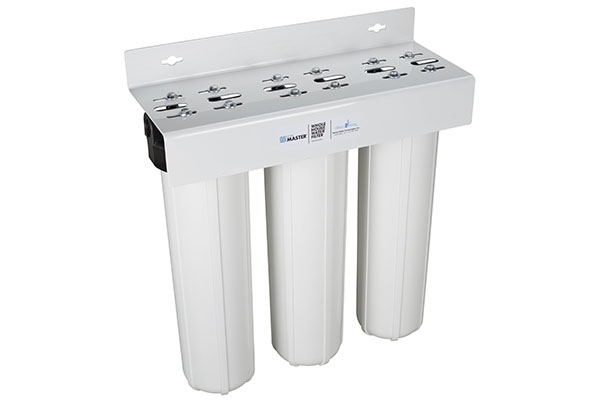
Home Master HMF3SDGFEC is mainly designed to get rid of sediment, poor taste and foul odors in water through its 3-stage filtration process. It features both coconut shell carbon and sediment filters and huge filter housings with ports, around one inch each, to deliver strong water pressure.
>>>> Click Here To See Customer Reviews & Current Price <<<<
iSpring WGB32B Whole House Water Filter
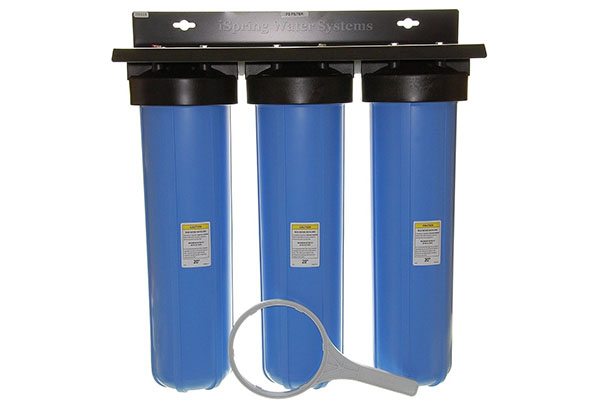
iSpring WGB32B utilizes jumbo filter housings, providing a wide range of filters and filter combinations. It has a 15-gallon per minute water flow rate, and is designed to remove rust, sediment, heavy metal, chlorine and other harmful contaminants in water.
>>>> Click Here To See Customer Reviews & Current Price <<<<
Reverse Osmosis Revolution WHF-34V2
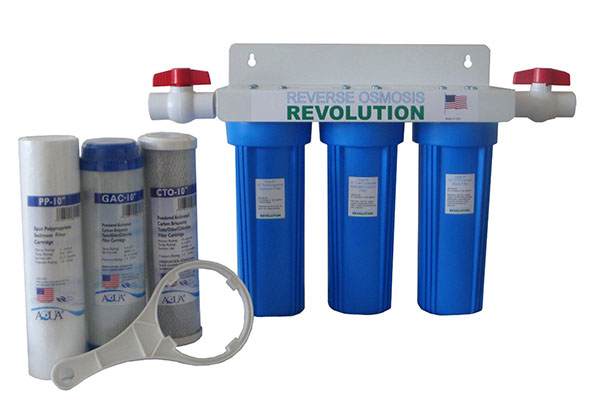
Reverse Osmosis Revolution WHF-34V2 is one that you can attach to your household’s plumbing system with ease. It also performs its filtration process through three stages – all of which have the ultimate goal of removing unpleasant taste and color, offensive odor, cloudiness, dirt, rust, sand, and dust in water.
>>>> Click Here To See Customer Reviews & Current Price <<<<
CRYSTAL QUEST® Whole House Water Filter
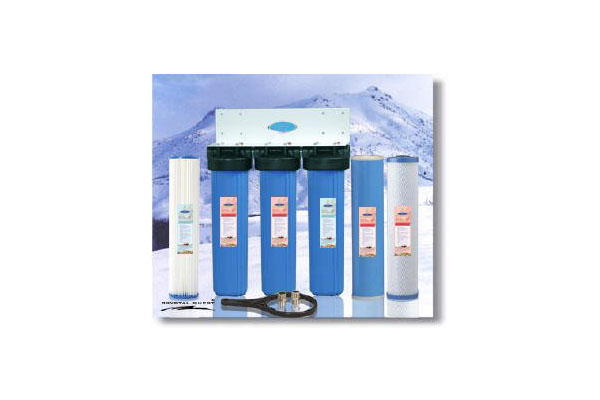
With this whole house water filter from Crystal Quest, enjoying healthier and purified water is possible. Water undergoes 8 stages of filtration, making it possible to deliver the cleanest output possible. The 8-stage filtration process aids in removing lots of harmful contaminants.
>>>> Click Here To See Customer Reviews & Current Price <<<<
3M Aqua-Pure AP902 Whole House Water Filter
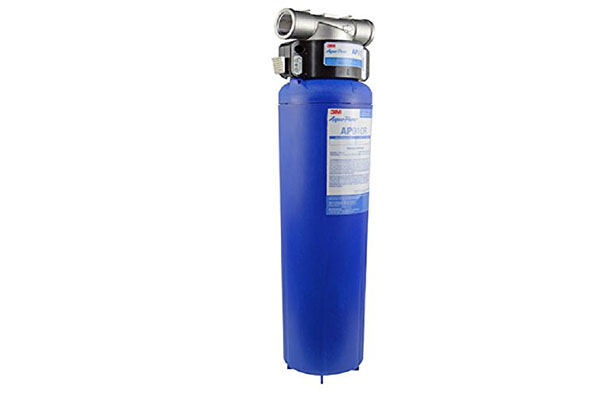
Perfect for large homes and light commercial applications, AP902 can do the filtration process at a flow rate of 20-gallon per minute. It boasts of a carbon filter media designed to minimize the odor and taste of chlorine. Its housing features a head made of stainless steel, locking latch and mounting bracket.
>>>> Click Here To See Customer Reviews & Current Price <<<<
Aquasana EQ-1000-AMZN Whole House Water Filter
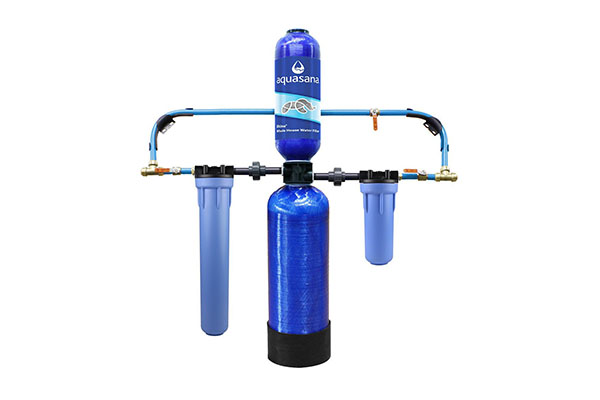
Aquasana EQ-1000-AMZN is a high performance whole house water filter, which can produce healthy and great tasting water. It is long lasting, and has a 1-million gallon capacity. It has an intelligent design, maximizing its filtration media for optimal performance.
>>>> Click Here To See Customer Reviews & Current Price <<<<
GE GXWH20S Whole House Water Filter
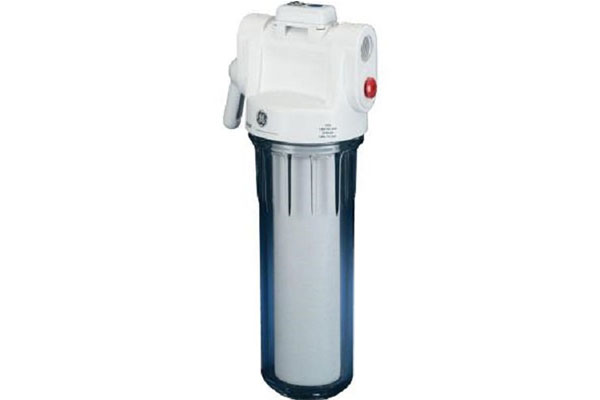
GE GXWH20S utilizes a filtration process, which involves two stages, meaning it filters water twice with an aim of removing sand, rust, silt and dirt from it. It also features a faucet made of chrome, filter replacement indicator, and easy to use twist and lock design.
>>>> Click Here To See Customer Reviews & Current Price <<<<
Express Water WH300SCGS Whole House Water Filter
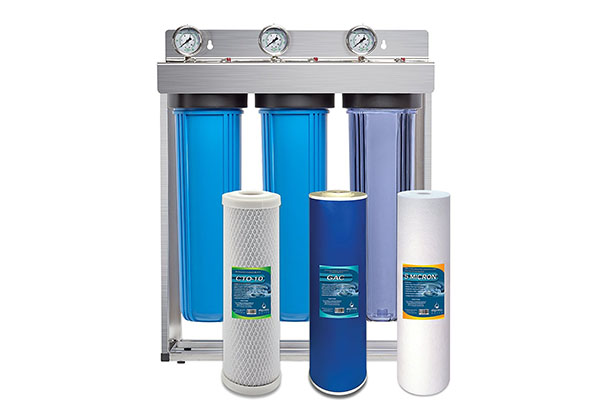
Express Water WH300SCGS is versatile considering its use in almost all of your water applications, such as for your outdoor and indoor plants, and for your entire family. It has a water pressure test gauge, water pressure release button, and a lead-free brass insert.
>>>> Click Here To See Customer Reviews & Current Price <<<<
APEC Water Systems CB1-CAB20-BB Whole House Water Filter
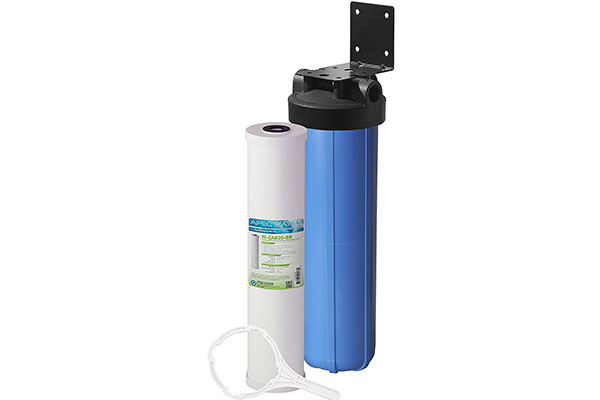
APEC Water Systems CB1-CAB20-BB is designed for industrial, light commercial and whole house filtration applications. It has an activated carbon filter cartridge, which can eliminate harmful compounds and chlorine in water. It has a 25-micron carbon filter, and can treat more than 100,000-gallon of water.
>>> Click Here To See Customer Reviews & Current Price <<<<
Types Of Whole House Water Filter
Despite all tap water looking similar, yours and the one in a house 1000 miles away could be different in simple or massive ways. As a result, filtration systems have to take on different forms.
Carbon Filter: This type is commonly found in undersink filtration systems and water filtration pitchers. It works by trapping contaminants through the filter’s pores.
Reverse Osmosis: Dissolved chemicals are removed and salinity is significantly reduced in the reverse osmosis filtration system. Combining a semipermeable membrane with high pressure, it separates safe drinking water from reject water.
Distillation: The distillation filtration system separates all non-H2O components from the water through condensation. The result of this process is pure H2O — water that contains no contaminants, chemicals, and even minerals.
Water Softener: Households with hard water will benefit most from this system. This exchanges the high calcium and magnesium contents of the water with sodium or other minerals to make it softer.
UV Microbiological Treatment Systems: Waters containing viruses and bacteria are best disinfected with this system. It basically does the same job as chlorine but without the risk of ingesting harmful chemicals.
How To Select a Whole House Water Filter
Have Your Water Tested: You first need to know what microscopic elements linger in your water to aptly choose a filtration system. Common water contents, after all, are categorized as minerals, chemicals, and microbes; not all of them are harmful.
Send a sample from your tap in a lab. If, however, your local water treatment facility is transparent and friendly, it will be easier to just ask.
Decide Which Contents You Want Reduced or Removed: If you don’t specifically need safe drinking water pouring from your shower, garden hose or laundry faucet, you can live with a few mineral contents.
Measure Your Water Usage: Some systems have flow rate limitations. Should your requirements far exceed it, it could result to low water pressure.
During your household’s peak water usage, see how many gallons per minute are flowing out. Don’t forget as well to check the demand ratings of certain appliances like dishwashers, and of course, the toilet.
It should be NSF Certified: Make sure you are getting quality products by looking for its NSF certification. This independent third-party body assures the filtration system meets international health and safety standards.
How To Maintain Your Whole House Water Filter
Once the filtration system has been installed, it’s virtually permanent. And, depending on the type, it usually requires minimal maintenance, entailing only the regular changing of filters.
It’s important to schedule your system’s filter change. Because if you don’t or if you forget, the filtered out elements of your water will build up and cause clogs.
This build up wouldn’t cause damages on your system, but it will decrease water pressure. If you still have to wait for the company to change filters for you, imagine the inconvenience this will cause.
Some systems require its filters changed every three to six months, while others, nine to twelve months. Of course, one factor that could affect frequency is the amount of material in your water.
Also, there are systems with only one major filter, and some with several in place. Depending on the manual’s specifications, each may need different changing schedules.
You can call the company to have the filters changed for you, especially if you don’t have technical know-hows. If you can manage, however, you want to stock on filters, so you won’t have to go out and buy every time.
How Whole House Water Filters Work
Whole house filtration systems generally include four processes to effectively clean your tap. Some types may of course vary from this, but they more or less follow the same concept.
Removal of large particles: Unfortunately for them, the largest particles get filtered out first. This first step is necessary because it prevents the immediate reduction of flow rate.
Removal of chlorine and other contaminants: Water treatment facilities chlorinate the water to disinfect it. To make it safe for human use, however, chlorine and other chemicals must be removed, hence this second step.
Elimination of impurities: Despite the first two steps, your water will still contain impurities. They will be picked out by the activated charcoal. The EPA is required to be placed in this step.
Waste Removal: The wastes that have been removed from the previous three steps will still look regular tap water. They, however, would need to be flushed out, or at least, used on non-health-risking activities such as washing the car.